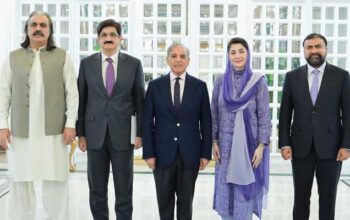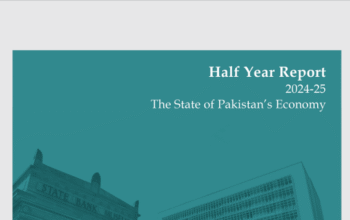By Staff Reporter
KARACHI: Pakistan’s central bank on Monday held its key interest rate at a record 21 percent, as expected, suspending its monetary tightening campaign as the economy slows and inflation has peaked.
The State Bank of Pakistan (SBP) said it expects record inflation at 38% to start falling from June onwards.
“The monetary policy committee (MPC) views inflation to have peaked at 38 percent in May 2023, and barring any unforeseen developments, expects it to start falling from June onwards,” the central bank said in a statement.
The SBP said it had taken stock of the cumulative impact of the substantial monetary tightening undertaken so far, which is still unfolding.
“On balance, the MPC views the current monetary policy stance, with positive real interest rates on a forward-looking basis, as appropriate to anchor inflation expectations and to bring down inflation towards the medium-term target, barring any unexpected domestic and external shocks.”
The central bank also noted that the slowdown in economic activity was in line with the trends in high-frequency indicators, especially double-digit declines in volumes of auto, POL and domestic cement sales, and contraction in large-scale manufacturing during the course of this fiscal year.
“These trends are expected to continue in the near term due to the accumulated impact of tight policies.”
The SBP expected reduced demand-side pressures and an easing in inflation expectations, along with moderating global commodity prices and a high base effect, would help bring inflation down from June 2023 onwards.
“In this context, the MPC views that maintaining the current policy stance is necessary to bring inflation down to the medium-term target range of 5–7 percent by the end of FY25.”
The central bank would continue to monitor the evolving economic and financial conditions and take appropriate policy actions as needed.
Meanwhile, the central bank chief said the country was not considering any debt restructuring, in contrast to comments made by the finance minister last week.
“As far as the State Bank of Pakistan is concerned, there is no plan of domestic or foreign debt restructuring,” Governor Jameel Ahmad said in a briefing to analysts.
“Absolutely no doubt about it. We are not considering any such plan, so there is no question of what will be the haircut,” he added.
After presenting the federal budget for FY 2024, finance minister Ishaq Dar had said that the government is working on the possibility of restructuring its bilateral debt regardless of whether it successfully completes its IMF review.
“We’ll see how things go,” Dar had told reporters, a day after releasing the budget for the 2023-24 financial year, referring to whether to restructure or reprofile debt as Pakistan continues to speak with the IMF about its stalled bailout funds.
Ahmad said that most of Pakistan’s debt is bilateral and multilateral, and that the country had already paid a large amount of commercial debt. He added that Pakistan would continue to pay its Eurobonds when they are due.
The governor said Pakistan had already paid $0.4 billion of the $3.6 billion in external repayments due in June 2023. The remaining $2.3 billion would be rolled over, while $0.9 billion would need to be financed.
The total debt requirements for fiscal year 2024 are expected to be $23 billion, according to the central bank. The SBP will announce how it plans to fund this debt in the next monetary policy statement, which is due to be released in July, the governor said.
Copyright © 2021 Independent Pakistan | All rights reserved




